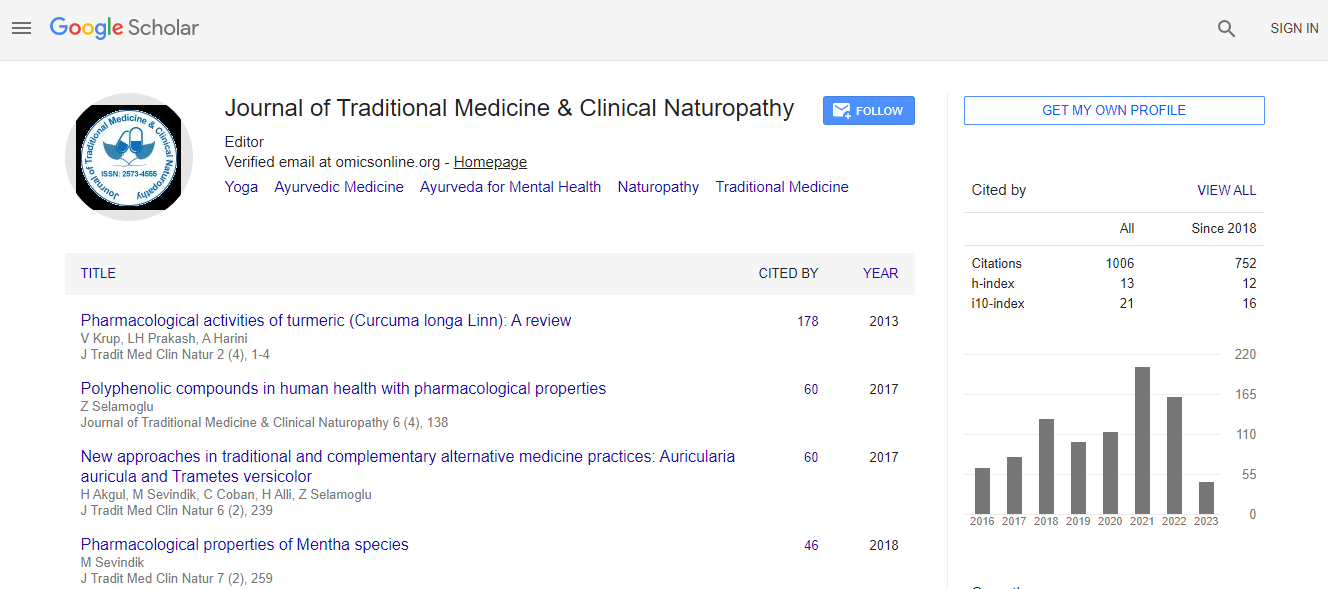Our Group organises 3000+ Global Conferenceseries Events every year across USA, Europe & Asia with support from 1000 more scientific Societies and Publishes 700+ Open Access Journals which contains over 50000 eminent personalities, reputed scientists as editorial board members.
Open Access Journals gaining more Readers and Citations
700 Journals and 15,000,000 Readers Each Journal is getting 25,000+ Readers
Google Scholar citation report
Citations : 1504
Journal of Traditional Medicine & Clinical Naturopathy peer review process verified at publons
Indexed In
- CAS Source Index (CASSI)
- Google Scholar
- Sherpa Romeo
- Open J Gate
- Genamics JournalSeek
- RefSeek
- Directory of Research Journal Indexing (DRJI)
- Hamdard University
- EBSCO A-Z
- Publons
- Geneva Foundation for Medical Education and Research
- Euro Pub
- ICMJE
Useful Links
Recommended Journals
Related Subjects
Share This Page
Demographic factors affecting quality of life among HIV-infected people attending a primary health clinic in South Africa: Future role of herbal/traditional medicines
Joint Meeting on 2nd World Congress on Traditional & Complemenatry Medicine & 2nd International Conference on Herbal & Traditional Medicine
Lucky Norah Katende-Kyenda and Bulelwa Mabindla
Walter Sisulu University, South AfricaGeneral Practitioner, South Africa
ScientificTracks Abstracts: J Tradit Med Clin Natur
Abstract
The study assessed Quality of Life (QoL) among HIV-infected patients and its association with demographic factors. A cross-sectional study was conducted on adult patients recruited from the clinic. The QoL was assessed using a WHOQOL-HIV-BREF. Demographic information was collected using a semi structured questionnaire. Data were analyzed using SPSS 22. Correlations and ANOVA were performed for determining significance differences between domain scores and QOL variables. Post-hoc analysis was performed using Tukey’s to find contributing pairs to the differences. Of ninety-nine participants interviewed, 52% were females and 48% males. The mean-age was 37.53±9.127 (range 18-60 years), 35 (36.1%) had secondarylevel of education, 38 (40%) singles, 40 (40.8%) permanently employed with 40, 40.8% earning more than R4000 monthly and (64; 65.3%) lived in rural areas, 94 (96.9%) had chronic-diseases and 45, 48.9% were asymptomatic. The overall mean-scores for health-related QOL were 41±11.9 for psychological, 68.9±17.0 for physical, 39.7±26.6 for social, 58.1±13.2 for environmental, 29.5±28.7 for personal/spiritual/religious and 54.0±20.9 for level of independence domains. Associations of statistical significance were found between the following domains and demographic factors: Physical and gender (p=0.008), psychological and marital status (p=0.040), psychological and employment status (p=0.090), social and employment status (p=0.008); level of independence and HIV serostatus (p=0.028), personal and chronic disease (p=0.075) and social and place of residence (p=0.030). Gender, marital and employment status, HIV serostatus, chronic diseases and place of residence significantly affect the QOL of PLWHIV. Therefore, a sustained effort towards improving the QOL remains the mainstay of dealing with PLHIV, second only to treatment. A dedicated effort by the government and the private sector to help the HIV affected individuals financially by various schemes would likely bear fruit results. And it is of paramount importance to look at the future role of herbal/traditional medicines in PLWHIV.Biography
Lucky Norah Katende-Kyenda has completed PhD from North West University, South Africa. He is currently working as a Lecturer in the Department of Pharmacology, Walter Sisulu University, South Africa. He has published 33 papers in reputed journals.
E-mail: nkyenda1@gmail.com

 Spanish
Spanish  Chinese
Chinese  Russian
Russian  German
German  French
French  Japanese
Japanese  Portuguese
Portuguese  Hindi
Hindi 
